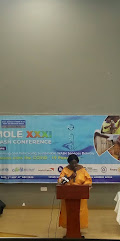STORY BY HAGAR SEY
 The Minister of Sanitation and Water
Resources, Cecilia Dapaah, has called on stakeholders in the Water, Sanitation
and Hygiene, WASH, sector to work together in achieving the Sustainable
Development Goal Six target by 2030. According to her, issues of WASH are a
shared responsibility. Madam Dapaah said this at the opening of the 31st Mole
Conference in Accra. It was under the theme, Prioritizing and Refocusing
Sustainable WASH Service Delivery; Lessons from the COVID-19 Pandemic. The
conference brought together stakeholders in the WASH sector to dialogue on
issues concerning WASH in the Country. Madam Dapaah noted that successful
achievement of the Sustainable Development Goals, SDGs is paramount. She said 17 goals under the SDG are inter-related, interdependent and mutually
reinforce each other. She said the government has not relented on its effort to
promote the universal sustainable development agenda and raise awareness on the
integrated nature of the Sustainable Development Goals. She said the
government’s response to the spread of the pandemic has yielded considerable
results; adding that stakeholders in the WASH sector have made significant
contributions in the fight against the pandemic. She said the SDG goal six- is
the central pillar to achieve many other goals like SDG 1- poverty reduction, SDG
2, food security and SDG 3, good health and well-being economic growth among
other goals. She said prioritization of WASH activities in all respects is more
important. Madam Dapaah said the government
will continue to partner with to CSOs, including the Development Partners, to
support Government agenda in the sector. She said government is committed to improve
WASH issues in the country.
The Minister of Sanitation and Water
Resources, Cecilia Dapaah, has called on stakeholders in the Water, Sanitation
and Hygiene, WASH, sector to work together in achieving the Sustainable
Development Goal Six target by 2030. According to her, issues of WASH are a
shared responsibility. Madam Dapaah said this at the opening of the 31st Mole
Conference in Accra. It was under the theme, Prioritizing and Refocusing
Sustainable WASH Service Delivery; Lessons from the COVID-19 Pandemic. The
conference brought together stakeholders in the WASH sector to dialogue on
issues concerning WASH in the Country. Madam Dapaah noted that successful
achievement of the Sustainable Development Goals, SDGs is paramount. She said 17 goals under the SDG are inter-related, interdependent and mutually
reinforce each other. She said the government has not relented on its effort to
promote the universal sustainable development agenda and raise awareness on the
integrated nature of the Sustainable Development Goals. She said the
government’s response to the spread of the pandemic has yielded considerable
results; adding that stakeholders in the WASH sector have made significant
contributions in the fight against the pandemic. She said the SDG goal six- is
the central pillar to achieve many other goals like SDG 1- poverty reduction, SDG
2, food security and SDG 3, good health and well-being economic growth among
other goals. She said prioritization of WASH activities in all respects is more
important. Madam Dapaah said the government
will continue to partner with to CSOs, including the Development Partners, to
support Government agenda in the sector. She said government is committed to improve
WASH issues in the country.
